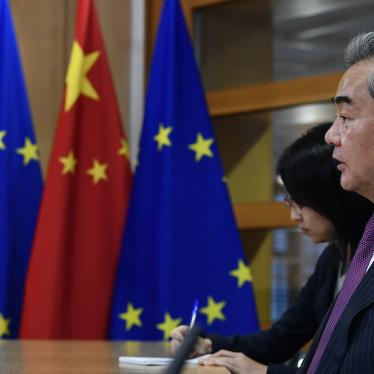Belgian Prime Minister Alexander De Croo and Foreign Minister Hadja Lahbib deserve praise for the country’s principled stance over the Gaza hostilities compared to most of its European counterparts. In a visit to China later this week, they should show the same resolve in urging Chinese authorities to end their atrocity crimes and pervasive repression.
Unfortunately, there are reasons to doubt whether De Croo and Lahbib are up to confronting the Chinese government on its appalling human rights record.
The two officials will be accompanied by CEOs of major Belgian companies, with the goal of boosting trade and business relations. Besides seemingly contradicting the European Union’s stated objective to “de-risk,” or reduce, supply chain dependencies from China, strengthening trade ties with Beijing should not mean overlooking the Chinese government’s serious rights abuses. These include the use of forced labor and inhumane acts against Uyghurs and other Turkic Muslims, as part of a crackdown that the European Parliament and the Belgian Federal Parliament have labelled as atrocity crimes, including crimes against humanity.
De Croo and Lahbib would be wrong to discount how China’s deepening human rights crisis will have serious implications for all European countries doing business with China. Unchecked bilateral trade and business carries with it a serious risk of complicity in those crimes. This will become even more urgent when new EU legislation on human rights and environmental due diligence, as well as on banning goods made through forced labor, come into force.
They would also be wrong to pretend the Chinese government can be a reliable political and business partner while it continues to crush basic freedoms throughout the country, as well as in Tibet, Hong Kong, and even dissidents abroad, including in Europe.
De Croo and Lahbib, especially while Belgium holds the EU’s presidency, should rather clarify to their Chinese counterparts that there can be no business as usual when crimes against humanity are being committed.
They should publicly call out Beijing’s grave human rights violations, lay out consequences for bilateral relations, and state an unequivocal determination to pursue accountability for those abuses. Failure to do so would only embolden Beijing’s sense of impunity and weaken Belgium’s stance as a government committed to human rights and international law.









